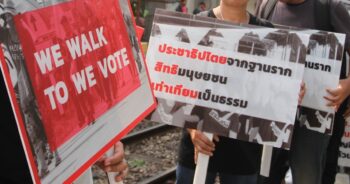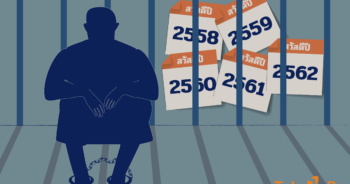Thai Lawyers for Human Rights (TLHR) calls on the National Council for Peace and Order (NCPO), the government and concerned officials to stop invoking power per Article 44 of the Interim Constitution B.E. 2557 (2014) and other special measures that grant the law enforcement and security forces sweeping power in the case of Wat Phra Dhammakaya, since the conduct might lead to human rights violations and is incompliant with the rule of law and international treaties to which Thailand is a ratifying State party.
On 15 February 2017, the NCPO invoked Article 44 of the Interim Constitution to issue the Head of the NCPO Order No. 5/2560 (2017) on “Measures to Demarcate a Controlled Area in order to Enhance the Effective Enforcement of the Law,” which designates Wat Phra Dhammakaya as a “controlled area” and grants “competent officials” powers to maintain security, including the officials from the Department of Special Investigation (DSI), police and military officials, administrative officials and other public officials as requested by the DSI. The Order has raised concerns on the principles of a rule-of-law state and human rights practiced by the law enforcement including:
1. The Head of the NCPO Order No. 5/2560 (2017) gives definitions of a “controlled area” and designates the power of competent officials, followed by the NCPO declaring Wat Phra Dhammakaya a controlled area. Based on the content, the Order aims specifically to act upon Wat Phra Dhammakaya. The enforcement is therefore incompliant with the principles of a rule-of-law state and the principle of general applicability, in which laws are required to be generally applicable in correspondence with the principle of equal treatment under the law. In a democratic society, such an Order would be subject to judicial review under the Constitutional Court, and consequently could be ruled unconstitutional.
2. The Head of the NCPO Order No. 5/2560 (2017) grants the competent officials greater power than those powers bestowed by the ordinary criminal justice process. Under this Order, the officials can gain access to and depart from the controlled area, summon individuals to report or give statements to the authorities, control the facilities of the area, enter buildings to search and seize individuals and vehicles, remove or destroy or move buildings or barricades, and carry out other acts similar to the exercise of power under the imposition of Martial Law or the declaration of a state of emergency. Such measures extensively infringe on the exercise of rights and freedoms of individuals, and shall affect at least 6,000 innocent civilians inside Wat Phra Dhammakaya.
3. The situation does not amount to a special circumstance in which the enforcement of security measures is required. The authorities can resort to power bestowed by the Criminal Procedure Code to carry out a search, arrest a flagrant offender, summon a person or seize a document, whereby penalties for obstructing official business are inscribed.
4. Article 44 of the Interim Constitution B.E. 2557 (2014), on which the Head of the NCPO Order No. 5/2560 (2017) was based, bestows on the Head of the NCPO legislative, executive and judicial powers. All orders issued under this Article are deemed legal, constitutional and final. Therefore, the Head of the NCPO Orders are not reviewed under a system of checks and balances, and are a grave violation of the principles of a rule-of-law state that could lead to the abuse of power and impunity.
Thai Lawyers for Human Rights (TLHR) requests the authorities to stop invoking power under the Head of the NCPO Order No. 5/2560 (2017), since it is incompliant with the principles of a rule-of-law state, applies specifically to Wat Phra Dhammakaya and infringes on the rights and freedoms of many individuals. The authorities are encouraged to resort to powers invested in them by the standard justice process. Justice cannot derive from the exercise of power with impunity.
With respect for the rights and liberties of the people
Thai Lawyers for Human Rights (TLHR)




